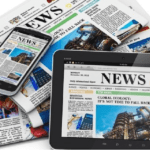The word dictionary is derived from the Medieval Latin word “Dictionnaruum”. This word again derives from the Latin word “Dicto”. This means phrase.
Dictionaries are indispensable resources in the review of language and linguistics. It is an essential guide book.
According to the New American Encyclopedia, a dictionary is “a book containing words arranged alphabetically with meaning, pronunciation, spelling, origin, or important explanation.”
That is, a dictionary is a book in which the words of a language or subject are arranged descriptively and the meaning and definition of the words are given.

Types of Dictionary:
Dictionaries can be of various types. But basically, the dictionary can be divided into two parts first.
1. General Dictionary or Linguistic Dictionary
2. Subject Dictionary
1. General Dictionary or Linguistic Dictionary: A general dictionary can range from pocket size to volumes. Dictionaries of a more general nature, also called table dictionaries, are so large in size that they are difficult to move around.
The number of words or entries in a typical dictionary depends entirely on its purpose. The scope of each type or size of dictionary depends on the practical perspective. Of course, it depends on the scope and usage.
A dictionary that contains all the words in a particular language in alphabetical order i.e., not the words in a particular subject but all the words in a particular language is called a general dictionary or linguistic dictionary. Example: The Oxford English Dictionary, Oxford Clarindo press 1986, 2 Vol. (Revised in 1913), Rep. 1964 .
General or language related campaigns are of three types:
- Unabridged Dictionary: Broadly, it consists of 250000 to 500000 words
- Semi-Abridged Dictionary : It contains about 200000 words
- Abridged or Desk Dictionary: Contains 15000 words or less
Subject Dictionary:
Such a dictionary restricts the scope to a particular subject and includes the maximum number of words on the subject concerned. So a subject dictionary can provide the same amount of explanation in its own context that a general dictionary cannot. Because the general dictionary is limited to a general subject area and its scope of use is wide. On the other hand, the thematic campaign covers a wide range of topics. Example: Sloa, H. S. and …Dictionary of Economics, 5th ed. Barnes and Nocole, 1971.
Other types of Dictionaries:
- Supplementary Language Dictionary
- Foreign Language Dictionary
- Glossary (A list of words with some explanation of a particular subject)
- Thesaurus (A treasury of words)
- Lexicon (A dictionary of some foreign language)
- Gradus (A dictionary designed to aid in the writing of poetry)
- Vocabulary (A list of words used in a particular language or book)
- Word Book (A collection of words)
Usage of the Dictionary:
Before purchasing a Dictionary, we need to know what it is used for. It is discussed below:
- Find the meaning of words or sentences;
- Checking spelling, grammar or syntax;
- Finding the correct pronunciation and spelling of words. Also, some helpful uses of the dictionary are:
- Review the history, including the origin and evolution of the word
- Determining usage rules in terms of current, rare and inconsistent vocabulary
- Dialect (provincial, regional or personal form of language or pronunciation)
- Identifying synonyms, antonyms and homonyms (sounding the same but having different meanings),
- Identify word symbols, abbreviations
- Foreign word list command
- Supply of quotations
- Introduction to historical and religious figures
- Introduction of important places, cities, mountains, seas, rivers, etc.
Evaluation of Dictionary Books:
Sources of information are very essential and valuable so their proper evaluation is very important. Content accuracy, depth, usability level, scope, etc. are things to check. So the things to look out for when evaluating a dictionary are:
Usages: Each book has a specific use. Dictionaries are used for spelling, pronunciation, etc. Sometimes these dictionaries are general glossaries and sometimes they are subject-oriented. So it is necessary to consider the following aspects during selection. For example:
- Who will use it (children, students, general readers or researchers?)
- For what purpose will it be used? (Vocational or recreational?)
- What kind of answers are available (biographical, geographical, historical or bibliographic?)
- How easy to use (indicative or implicit?)
Labels: Data sources are never parallel. Readers of any size book can go to a superficial level, sometimes to a deep level. Deep-level researchers or boys and girls, love to limit themselves to the simple level. So it must be carefully watched.
Accuracy: The accuracy of the content of the text is not easy to determine. It is a complex task. Therefore, it is necessary to think about whether it is possible to shed light on the conventional meaning and its proper application. In order to maintain the purity of the language, however, it is necessary to keep away from slang and foreign words.
Format/Physical makeup: The fourth issue is size, print and direction of obstruction. It can be judged in terms of readability and ease of use. If the printing is not good, it cannot be done well, if the size is not proper, it is difficult to use, if the barrier and paper are not good, it are not durable for long.
Authority: Many people can write books and anyone can be a publisher, but who has the qualifications, reputation and rights should be checked at each level. Therefore, the evaluation of the dictionary should be based on the quality of the compilation and not on the reputation and status of the publisher.
Purpose: Books are never written. There is a goal behind writing every book. In the dictionary, it is necessary to judge whether it is descriptive or purely semantic.
Arrangement: The internal layout of the dictionary should be evaluated, i.e. whether it is comfortable to use sequence, tense, alphabetical order, etc.
Recent: The subject of dictionary evaluation is the potential for continuous refinement and expansion. Language is variable. New words are being formed every time. Again, many words become completely obsolete. So whether it is modernized or whether it meets current needs should be seen.
Scope: Limited to each subject. If a dictionary covers its scope well, it contains various fields. We should consider if it includes protection of vocabulary and the expansion of the period during which words are used in literature. Additionally, we should check if it includes dialects, slang, unfamiliar words, and scientific terms in its vocabulary.
Composition style, special features, definitions, spelling, etymological groups or letter arrangement, period words, grammatical punctuation, etc. aspects have to be evaluated.




Hey there! I’m at work browsing your blog from my new iphone! Just wanted to say I love reading through your blog and look forward to all your posts! Carry on the superb work!
thanks a lot